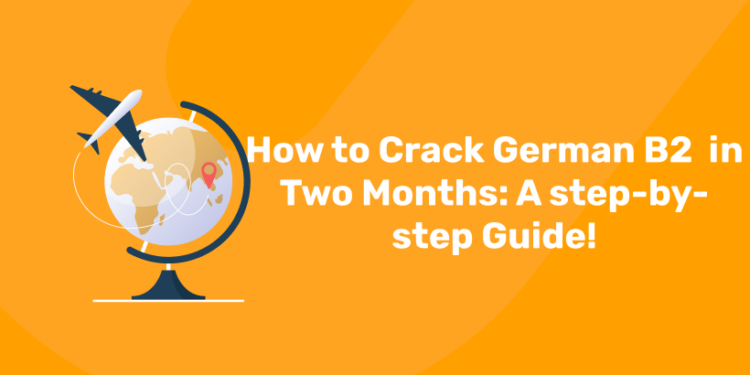Table of Contents
German B2 is an exam for youth and adults. It confirms that applicants have acquired advanced language skills and corresponds to level four (B2) of the six-level competence scale set out in the Common European Framework of Reference for Languages (CEFR).
Passing The Exam Demonstrates That You Can …
- understand the main content of complex texts on concrete and abstract topics, as well as professional discussions in one’s own field of specialization,
- communicate so spontaneously and fluently that normal conversation with native speakers is easily possible without much effort on either side,
- clearly and in detail express your opinion on current issues, explain your position on the current issue and state the advantages and disadvantages of different options.
Learn German language in your own language! Get free Demo Classes Here!
Introduction to B2-level German
B2 is an intermediate level of knowledge of the German language according to the Common European Framework of Reference for Languages (CEFR). At the B2 level, individuals have developed a solid foundation of German in addition to communicating effectively in various situations.
Levels in the German Language
- A1: Beginner
- A2: Elementary
- B1: Intermediate
- B2: Upper-Intermediate
- C1: Advanced
- C2: Proficient
The Goethe-Zertifikat B2 is the exam to be taken for a B2-level German certificate in India. It certifies candidates who have acquired advanced German language skills.
|
German A2 Exercises – Download Free PDF |
||
How to prepare for B2 level German?
1: How do you say "Good Morning" in German?
Preparing for the B2 German exam requires a systematic approach and dedicated practice. In addition, in order to study in Germany, universities usually require you to have an intermediate to advanced level of German (B2/C1).
Entri’s German language course ensures that you learn from industry experts to cover all B2 German requirements. This comprehensive course covers all four language skills, speaking, listening, reading and writing.
Learning B2 German usually takes around 100 hours of dedicated study. This can vary mainly depending on your previous knowledge of the language and how much time you can devote to learning it.
Here are some steps to help you prepare effectively for your B2 level exam:
- Firstly, evaluate your current German proficiency level to identify areas that need improvement.
- Secondly, read a variety of texts, including articles, short stories, and authentic German materials.
- Also, listen to German audio materials, such as podcasts, news broadcasts, and interviews. Focus on understanding main ideas, specific details, and nuances of spoken German.
- Engage in regular speaking practice to improve fluency, pronunciation, and accuracy and practice writing essays, letters, and reports within the time constraints of the exam.
- Lastly, consider enrolling in German Language Course from Entri or seeking guidance from a qualified German language teacher. They provide structured lessons, exam-specific strategies, and personalized feedback to optimize your preparation.
According to the Goethe-Institute, a candidate with at least 15 years of age and knowledge of the German language at level B2 is eligible for this exam. The test is therefore for anyone who is interested in demonstrating knowledge of German as a second and/or foreign language.
Level B2 can be challenging, but it can be a rewarding experience for students. When the student comes face to face with the complexities of grammar, expanding vocabulary, expressing their thoughts and opinions and much more. But with dedication and practice, you should be able to learn the language over time.
Free German A1 Mock Tests – Powered by AI!
Test your skills on our interactive platform. Get instant feedback from our AI to help you communicate better and track your progress. Start your free German mock test now.
Test Your German A1 for FreeGerman B2 – Exam Pattern
The exam consists of four modules which come under the Common European Framework of Reference for Language (CEFRL)
First Module is Lesen for German B2 level Exam – Reading
Marks – 100
Passing – 60
Time – 40 minutes
The reading module contains 5 questions
The first question:
has 9 sub questions and a time frame of 18 minutes to complete this task. It’s a topic-based question. There are four texts based on a topic, you need to find which statement applies to which text. Since all the texts are about the same topic, one must read the texts carefully to find the appropriate answer.
The second question
has 8 sub questions and a time frame of 12 minutes to complete this task. You must read a magazine’s article with blanks and find an appropriate match for each blank. There are 6 blanks and 8 sentences. 2 sentences don’t fit in the text and remain unfilled.
The third question
has 6 sub questions and a time frame of 12 minutes to complete this task. You read an info Text here and select an appropriate answer from three options a, b and c after reading the text carefully.
The fourth question
has 6 sub questions and a time frame of 12 minutes to complete this task. This is a topic-based question, and one must read the texts and find an appropriate heading for each text. You get 6 headings and seven texts out of which one of the texts won’t have an answer.
The fifth question
has 3 sub questions and a time frame of 6 minutes to complete this task. Here you get three texts as questions, and one must find a relevant Title for 3 texts out of the 7 headings given.
Second Module is Hören for German B2 level Exam – Listening
Marks – 100
Passing – 60
Time – 40 minutes
The listening module contains 4 questions
The first question
has 5 sub questions. Each question is either a dialogue, message on the answering machine or a weather report, announcement on railway station, airport or a supermarket. This section you will be listening to once. Each of these conversations will have two questions; 1. True or False, 2. Mark the correct option a, b or c.
Note: you get 15 seconds time to read each question. Do not let your thoughts distract you. Utilize this time to mark the key words and understand the requirement of the question.
Learn German language in your own language! Get free Demo Classes Here!
The second question
has 6 sub questions. This is mostly an interview with a personality on radio and has questions with three options to select the correct answer from a, b or c. You listen to this section twice.
Note: you get 90 seconds time to read the questions. Try to mark the key points and get more insights about the topic of conversation. Besides it’s an interview so do not expect any pauses in the middle of questions.
The third question
has 6 sub questions. This will again be an interview but between three people, the presenter and two guests. You need to find out who said which sentence and mark it accordingly. You listen to this section once. This is same as fourth exercise of B1 listening
Note: you get 60 seconds time to read the questions. There’ll always be two same gendered people talking together, hence it’s extremely confusing to identify the differences. You can write the characteristics of the voice right in the beginning to avoid the confusion. For example, if it’s an old or a young person, has a heavy or a light voice.
The fourth question
has 8 sub questions. This is a presentation on a particular topic. You need to find out the correct answer from the options a, b and c. You listen to this section twice.
Note: you get 90 seconds of time to read the questions. Since you listen to this twice, focus on the first attempt to make rough notes of what you hear with the help of short abbreviations and key points and mark the answers in the second go.
Third module is Schreiben for German B2 level Exam – writing
Marks – 100
Passing – 60
Time – 75 minutes
The writing module contains two questions.
The first question
is expressing your Forum post. This is a topic-based question, for which you don’t get another topic as an option. You need to work on 4 given points and compose a meaningful and coherent Text within the limit of 150 words. The time frame for this section is 50 minutes and demands a good knowledge and understanding of the topic.
The second question
is about writing a formal letter. It is most of the time a complaint letter. You are given a situation with 4 points. You must find a relevant connection between the points and write a letter using the correct salutation and greetings. The word limit for this section is 100 words and the time frame is 25 minutes.
Note: Writing is a highly controllable Part. One has a lot of time before, during and after writing a text to make necessary changes. Utilize this advantage by spending 5 minutes before and after writing the text.
5 minutes before to Understand the need of the question and to decide the flow of the text. 5 minutes after to check and correct the mistakes yourself.
Fourth module is Sprechen for German B2 level Exam – speaking
Marks – 100
Passing – 60
Time – 15 minutes for both candidates
The speaking module has two questions
The first question
is about making a presentation. You have to make a verbal presentation about one of the two topics. Your presentation should explain all the given points under the topic and shouldn’t exceed 4 minutes. The examiner may or may not ask you a question related to your presentation.
The second question
is about debating on a topic. You must clear your viewpoint and react to your partner’s opinion and counter opinion. By the end of the discussion, you should reach a decision, whether you are for or against the given topic. The time Frame for this question is appropriately 5 minutes for both the candidates.
Note: You get 15 minutes of preparation time before the exam and use this time for both the questions. One must prepare alone and don’t get to discuss the debate topic with your partner. One can make a note of important points and your ideas. However, in the exam one must speak freely.
6 strategies for boosting your German from Beginner A1 to the advanced level B2
These strategies make you think, analyze and reflect on what you learn – these principles are also called active learning.
1. Never learn German vocabulary that’s irrelevant.
The biggest vocabulary learning mistake we see is rote memorization of lists of frequencies. This is a waste of time and such a lousy way to learn. Your brain only retains what it deems important. It is extremely difficult to find something important when you don’t really know why it is important. Over time it gets too dull and feels more like a chore. Even repeating it over and over won’t break it.
Effective vocabulary discovery means learning only words that you find interesting and relevant. One criterion for this is the likelihood of the word being used in everyday life. Another is when it just looks interesting and fun. How would you discover such vocabulary? Here are a few ways:
- Browse a dictionary online and read the words and their meanings without trying to learn them
- Watch funny commercials
- Watch interviews on Youtube or read news
- Try to ask yourself about how you’d say something you just said in German. Then go to google and translate it
How effective is it to spend more time on each word? – you can ask. Learning vocabulary is not just a numbers game. If you learn 100 words a day and forget 99% of them within 3 days, you are basically wasting your time. You could learn just 1 word a day, but spend more time on it so you never forget it and know exactly how to use it, and you might learn other words that appear frequently in the same context because you’ve done more research. In short, additional research helps a lot with long-term retention.
Pretty cool way to create context around a word. Yes, you spent more time, but now you’re much more likely to remember it. Discovering a great German song is a sweet bonus.
2. Practice speaking with a native tutor
Here is the king of all problems we German students face: we don’t know enough German. Finding an opportunity to practice English is much easier than German. If you’re not in Germany, you might think that moving to Germany would give you more opportunities to practice, but many expats in Berlin complain that practicing German is a challenge because everyone either speaks or immediately switches to English.
Some people manage to find tandem exercise partners. If you find a great tandem partner, that’s awesome and you should definitely do it.
But it is not easy for various reasons. Your native language may not be required. Or maybe you don’t have the time or desire to teach others.
In that case, getting a private tutor is the best shortcut to getting lots of German practice. It used to be more expensive, but thanks to platforms like iTalki and Preply, getting conversational practice is now affordable.
For just 8-10 euros you get 1 hour of practicing German conversation with a native speaker! That is priceless. Be sure to go through several tutors to find the one that suits you best. Don’t settle for the first tutor you come across and find someone who is motivated and eager to help you.
3. Learn what you would learn anyway, but in German
You probably take online courses or read books on certain topics. Whatever fascinates you, most likely fascinates native German speakers. This means that there are books, podcasts, blogs, youtube channels and more about this topic in the German language. This is great because it allows you to learn about the things you love and improve your German at the same time.
You may find it difficult at first, but once you master the relevant words and phrases related to the topic, you will quickly get used to learning about it in German. It is extremely effective.
4. Create Tik Toks
If you have no way to practice your German, then TikTok is a great place to start. Many language learners share TikToks about learning German (or any other language), telling stories from their lives, and practicing new words they’ve learned. It’s a super supportive community.
5. Sign yourself up for a test
Some people have an unlimited supply of intrinsic motivation and can learn over and over. Most of us are not like that. Some of us need external pressure, such as a deadline or a social obligation, to take action.
If this resonates with you, then there is a great way to take advantage of it. Sign up for a German language test, 1 or 2 levels above your current level. Give yourself exactly 6 months. For extra support, make a public announcement and ask your friends to hold you accountable. If you do it right, 6 months before the test will be a game changer for your German skills. The cheapest German test is the Telc or Duolingo test.
Looking to conquer German B2 in just two months? Our intensive German language course is designed to accelerate your learning and help you master complex grammar, expand your vocabulary, and build confidence in speaking. With expert instructors, immersive learning techniques, and tailored lessons focused on fast progress, you’ll be ready to ace your B2 exam in no time
| German Language Courses | |
| German Language A1 Course Online Coaching | German Language A2 Course |
| German Language B1 Course online Coaching | German Language B2 Course Online Coaching |
| German Language Course in Different Cities |
| German Language Course in Trivandrum |
| German Language Course in Thrissur |
| German Language Course in Kottayam |
| German Language Course in Kochi |
| German Language Course in Calicut |
Free German A1 Mock Tests – Powered by AI!
Test your skills on our interactive platform. Get instant feedback from our AI to help you communicate better and track your progress. Start your free German mock test now.
Test Your German A1 for FreeFrequently Asked Questions
Is B2 German exam difficult?
The TELC B2 is considered a moderate-level exam, and you need to score 60% marks to clear the exam. Moreover, its difficulty level depends on various factors, including one skill as well as one level of preparation. One can clear this exam by achieving a B2 level proficiency in the German language.
What is German B2 exam?
The Goethe-Zertifikat B2 is a German exam for young people and adults. It certifies that candidates have acquired advanced language skills and corresponds to the fourth level (B2) of the six-level scale of competence laid down in the Common European Framework of Reference for Languages (CEFR).
How do I get a B2 German certificate?
A minimum age of 16 years is recommended to take the Goethe-Zertifikat B2 exam for adults. To sit the Goethe-Zertifikat B2 exam, candidates must have German language skills corresponding to the B2 level of competence of the Common European Framework of Reference for Languages (CEFR).
Is B2 enough to get a job in Germany?
If you´d like to work in Germany you´ll get by if your German is on level B1/B2 (online test). The certificate issued by GLS is recognized by many employers and even some universities in Germany.













